Noname wears Julia Heuer top and skirt, Tory Burch shoes, Laura Estrada earrings, Jenny Bird ring and bracelet.
The rapper and poet Noname first rose to prominence in 2016 with her breakout album “Telefone,” which seemed to be bumping on every speaker that year. Her most recent album, “Sundial” (2023), further solidified her as one of the best rappers around. Part of what makes her music exemplary is its love for literature and activism, using literary devices to speak in solidarity with protest movements, like her song “hold me down,” which opens with an allusion to “Stop Cop City’’ in Atlanta. “Rap is poetry that’s put to music,” Noname tells me. “I do see poetry and rap as one and the same.”
For Noname, one of the early entry points to creative writing and rap was the YOUmedia project at the Chicago Public Library, where she took a poetry workshop as a teen and started an open-mic series called “Lyricists Loft.” Other Chicago-based musicians, such as Jamila Woods and Chance the Rapper, benefited from similar youth literary programs like Young Chicago Authors (YCA) during this era. To this day, Noname remains an advocate for public libraries and the dissemination of revolutionary literature. She has spoken about the high cost of books and has advocated for book donations, leaking PDFs and other forms of making literature accessible.
In this ethos of supporting access to literature, especially for Black leftists, Noname began a book club in 2019. The Noname Book Club has since opened 14 chapters across the United States, as well as launching affiliated prison chapters. In 2021, Noname expanded on this groundwork and opened the Radical Hood Library in the Jefferson Park neighborhood of Los Angeles; it provides a physical space for local communities to organize politically and access books.
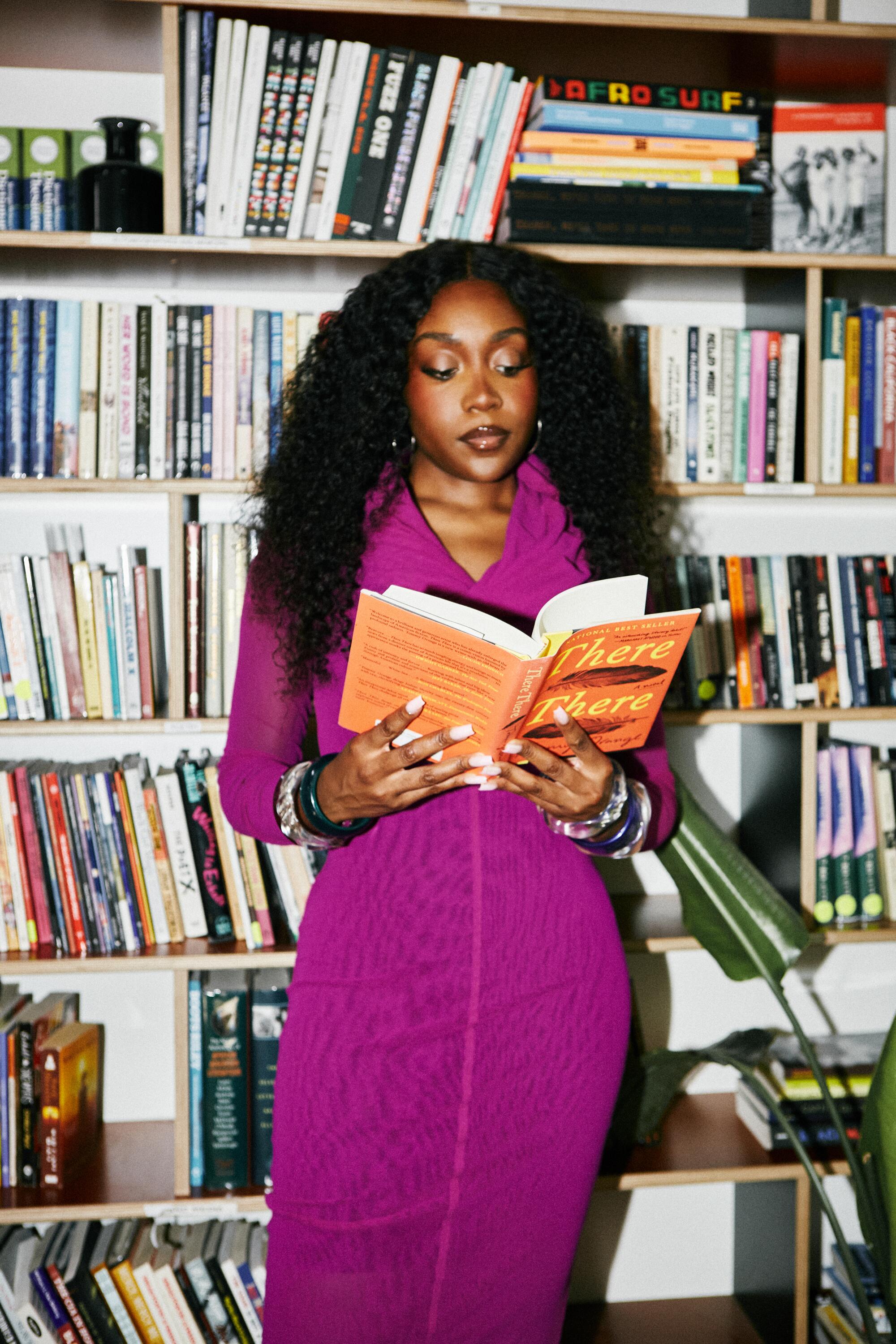
Noname wears Jean-Paul Gaultier from Paumé Los Angeles, vintage Lucite bangles from Paumé Los Angeles, Ariana Boussard-Reifel earrings, Nomia NYC shoes.
Recently, we met at the Radical Hood Library, where ferns hang from the ceiling and posters on the wall celebrate Black love. The bookshelves are organized with titles such as “Femme Labor,” “Abolish Prisons,” “Español / Spanish” and “Settler Colonialism in Occupied Americas.” Noname wasn’t the first person in her family interested in the intersection of literature and movements for Black liberation. Back in the 1990s, her mother, Desiree Sanders, began running Chicago’s Afrocentric Bookstore, which provided access to a broad range of books by Black authors. For Noname, her book club and library are a continuation of her mother’s legacy.
Christopher Soto: How have the literary arts influenced your music and vice versa?
Noname: I would say I was reading a lot of poetry when I first started writing, so that definitely had an impact on my rap style. A lot of people actually don’t even call me a rapper. They just call me a poet. I think I am a rapper. But because stylistically I use so many poetic devices, that ends up being the running narrative. A lot of my music is abstract, whereas sometimes rap is a little more straightforward, [so] that gives my music a sort of edge to it.
I would say music has influenced my writing in its form and probably what I’m trying to convey. In my music, I tend to be a bit more concise and straight to the point; I would expand a bit more if I was writing a short story or a novel. I think my music actually ended up being a lot more political than some of my other forms of writing, because it feels like a tool, [whereas in my] poetry I tend to be a little more self-indulgent. With music, there’s this hyperawareness of a listener.
CS: Could you tell us about your mother’s bookstore in Chicago, the Afrocentric Bookstore?
N: She opened the space in 1990. When it first opened, it was actually a tiny bookstore in the back of another store. Initially, she didn’t have her own location. It was open for about 18 years. It was a space to promote Black literature. My mom hosted book signings with people who were famously published but also a lot of independent local writers in Chicago. I just remember being little and being told to move books and boxes around. When I was about 5, I got to see Maya Angelou in the space. I don’t remember her speaking but my mom got us together in a picture. I saw Cornel West, Tyra Banks, and Mo’Nique, who had this book called “Skinny Women Are Evil.” It was the 2000s. It was a different time. Her bookstore carried so many different types of books. She drew several different segments of the Black community into the space. Although she sold all kinds of books, she definitely had a segment that was based on Black radical literature — Fanon, Assata and all the formative Black leftist texts were there. There were several different entry points, and it was cool to see so many different types of conversations that were able to be facilitated in the space. That feels pretty invaluable.
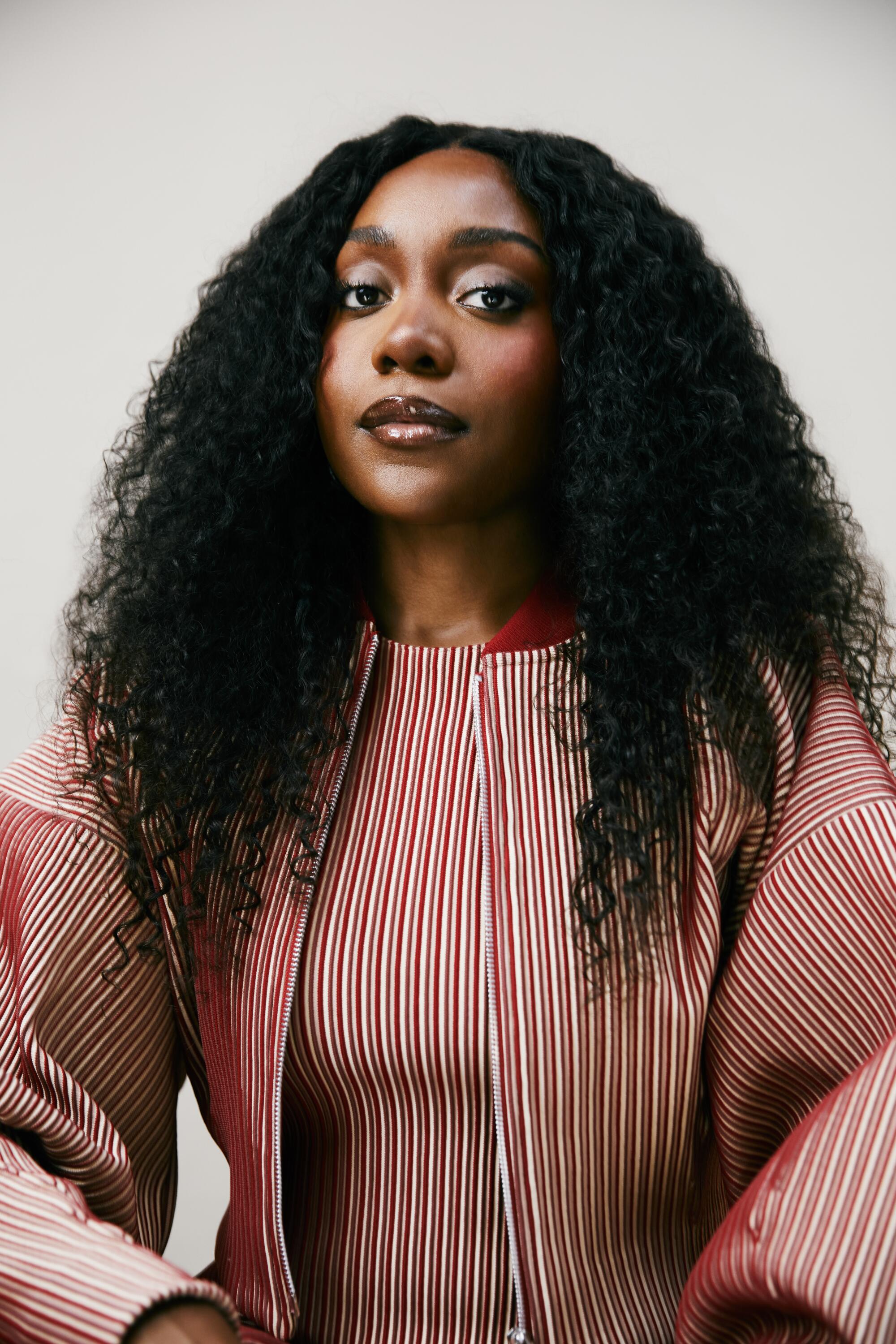
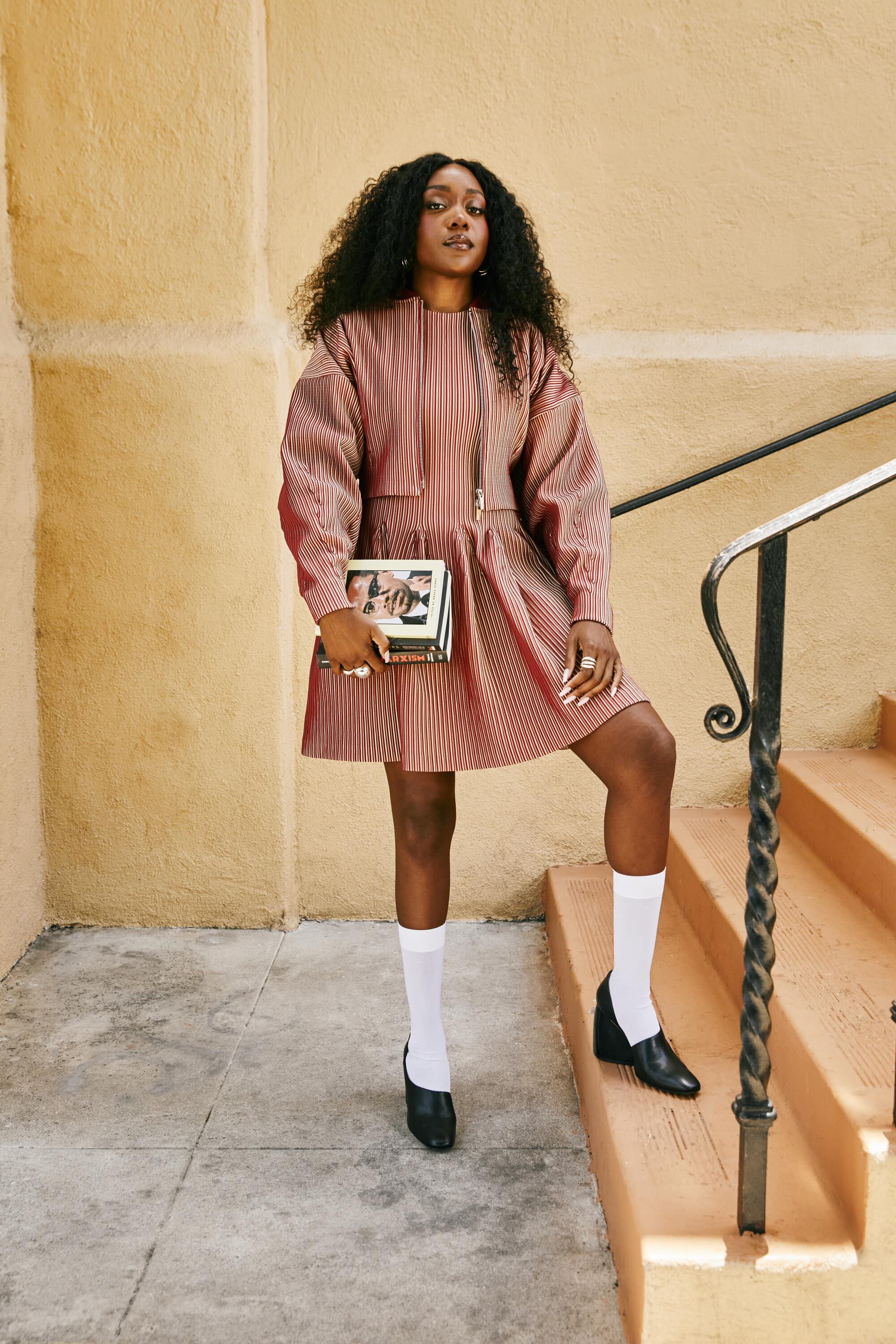
Noname wears CFCL jacket and dress, Loewe shoes from Paumé Los Angeles, Sheerly Touch-Ya stockings, Jenny Bird rings.
CS: It’s the fifth anniversary of the Noname Book Club. What are you most proud of from the first five years and what excites you about the next five?
N: I’m most proud about the community we’ve been able to build. Currently we’re in 14 cities, plus our inside chapters as well. Being able to foster collective reading with people who are incarcerated, as well as people on the outside, has been really dope. In the next five years, I’m looking to make the program more pan-African and get into building more chapters across the Black diaspora. I’ve always wanted to do that, but it’s just been a matter of capacity. Part of the reason why I wanted the Book Club to be in prisons is because I wanted it to be accessible to Black people wherever they were. I want the Book Club to be in Guyana, Tobago, Martinique, Ghana, Brazil, Cuba, wherever Black people are.
CS: The program to donate books to incarcerated readers is a key part of the work that you do at the Radical Hood Library. Can you speak more to why you found this work important?
N: Many folks on the outside either don’t think about incarcerated people or have a negative and stereotypical view — that people who are incarcerated are deserving of violence or a lack of resources or poor treatment in the prisons where they live. I don’t believe that. Angela Davis said it best: “Prisons do not disappear problems, they disappear human beings.” That’s what prisons do. Our program is a way of still being in community with incarcerated people, even though the state is actively trying to dismantle those links. I don’t want to just be sending books. We try to incorporate how incarcerated people feel about the books into the rest of our clubs, as if they were with us at our local meetings. So sometimes we are reading their responses to the books in our meetups, like a real unified community.
CS: Your song “Don’t Forget About Me” mentions an email where a fan wrote about how your music saves lives. Can you speak more to this feeling, about the impact that you hope art can have on the world?
N: I think art is naturally transformative. It helps us to see beyond ourselves and into other people’s experiences or viewpoints. Art lets us sit in different emotions that we may not usually allow ourselves to rest in. I think art is also a tool in bridging the gaps in cultures and languages. It can be incredibly universal and can be used to connect folks.
I think art also has its limitations. As much as I believe in the power of revolutionary art, I don’t think that’s enough. I think art is art. But action is something else. I think about how I can push my narrative with art. Gotta be careful with art because art can condition us. A lot of what we value culturally is based on movies that we watch, music that we listen to, books that are popularized and that we read. I think there’s a reason why there’s not a bunch of leftist art on the radio. Art is often used as a tool by capitalists or by the state.
CS: Totally. The Paris Review and other literary initiatives were connected to the CIA and produced nationalistic propaganda.
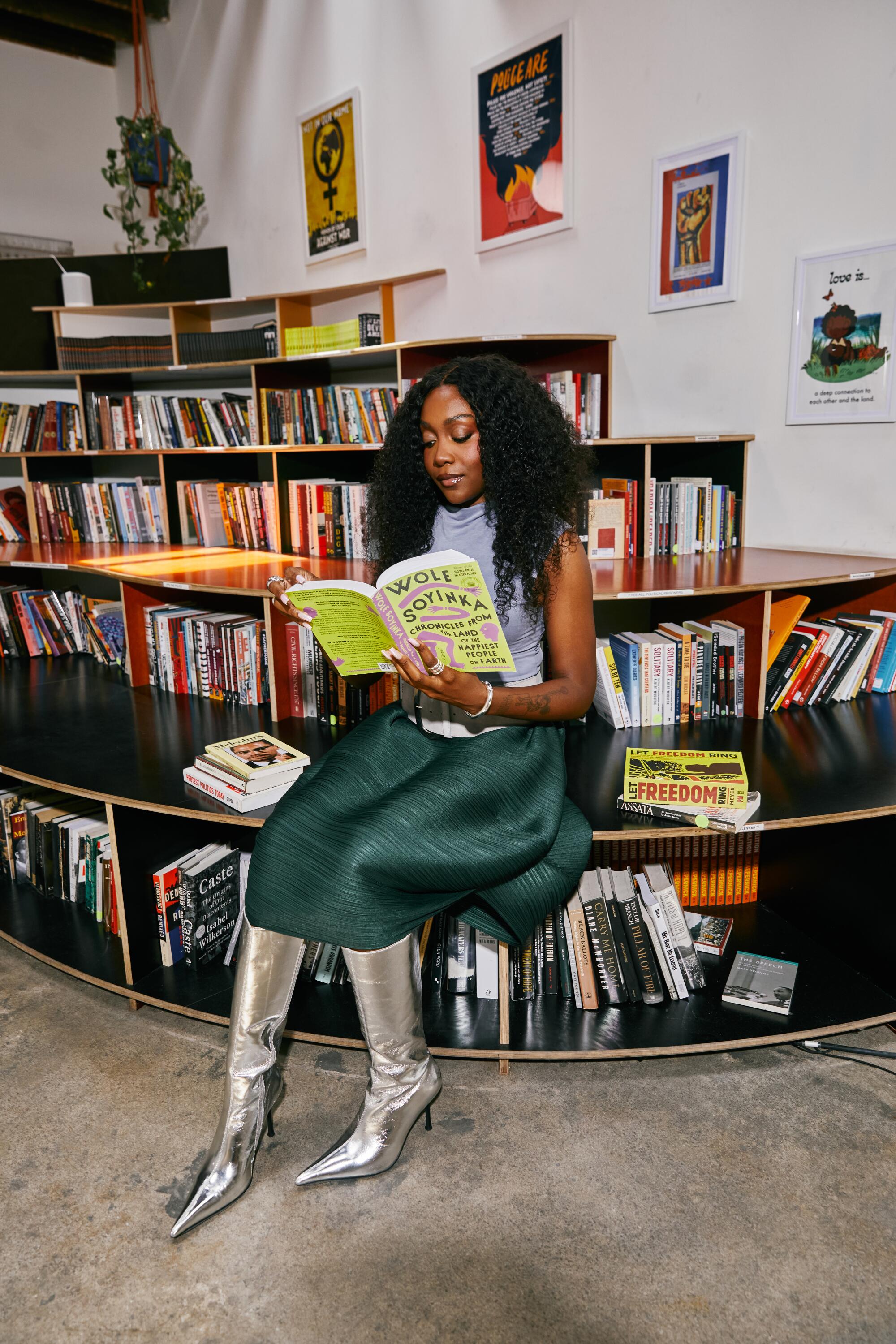
Noname wears Paloma Wool top and belt, Pleats Please by Issey Miyake skirt, Jeffrey Campbell shoes, Ariana Boussard-Reifel earrings, Jenny Bird and Laura Estrada rings, Jenny Bird bracelet.
N: I mean, “The Birth of a Nation,” the first [blockbuster] film ever created, was the most anti-Black and highly racist film. It perpetuated anti-Blackness globally. To play something like that at the White House — it shows you the function of what art can do. As leftists, I think it’s beneficial for us to see how the government is using art and for us to create some sort of a counterbalance. But I always go back and forth with it. Because I don’t want artists to feel like they just have to make super-politicized art. If people want to make something that’s more frivolous or highly emotive, then I think we should have that freedom as well.
CS: You have spoken about government interference in the dissemination of radical Black literature before. It’s well documented how the FBI has monitored and harassed Black writers from Lorraine Hansberry to Sonia Sanchez. Can you speak more to these histories and the power of literary resistance?
N: Black-owned bookstores used to be a space where Black people could come and organize and have radical conversations around like-minded people. The FBI intentionally destabilized and eradicated so many Black-owned bookstores in the ’70s and onward. In the ’90s there was a bit of a resurgence because there was a wave of Afrocentricity, especially in hip-hop culture. People were really into reading, and Black-owned bookstores were able to spring back up. But then they fell again with the rise of Amazon, which initially started with books. These sorts of spaces are fundamentally necessary because, although we do have access to state libraries, oftentimes they are not going to hold specific titles. We struggle as Black writers to even have our work published to begin with, and so having people in our community that have stores, where we can get the books directly to the community, is important.
CS: Would you ever consider publishing a poetry book or any other genre?
N: I don’t know. If I did, it might not be poetry. I’ve always had a deep love for short story collections. But it’s so on the nose that I almost don’t wanna do it. Everyone is expecting it because of all the book promotion. I wanna do it because my heart calls me and not just because it’s something I can do. I remember when I first launched the library, publishers were instantly reaching out and offering bread. The literary world is so hyper-capitalist and kinda gross. So if I do publish, I wanna do it in a way that feels ethical to me. I’ve always been very independent. I don’t know that I’d want to go to these big publishing houses. So we’ll see.
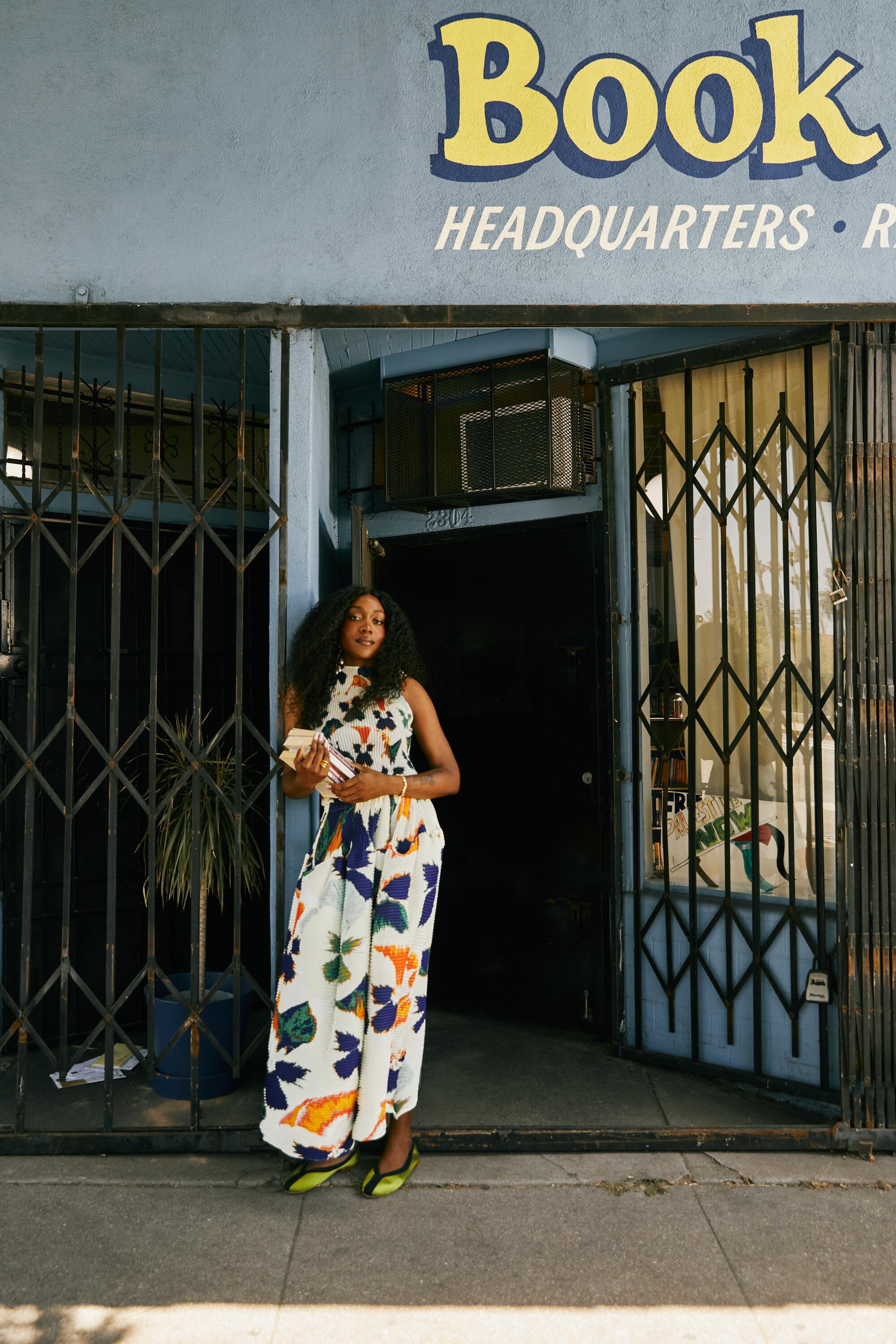
“We struggle as Black writers to even have our work published to begin with, and so having people in our community that have stores, where we can get the books directly to the community, is important,” says Noname.
CS: Is there anything you’ve read recently that folks should put on their radar?
N: Octavia Butler has this series “Xenogenesis.” It’s sci-fi, but some of the themes deal with racism and colonialism in a really interesting way. There are these alien creatures and it’s so weird. I like that you can play around with literature in a way where you can make certain political messages but also it’s this highly entertaining otherworldly story. The politics are there if you want them, and if you are just a sci-fi reader who wants to escape in a book, it also serves that function.

Production Mere Studios
Makeup Nimai Marsden
Hair Nena Melendez
Photo Assistant Amari Dixon


